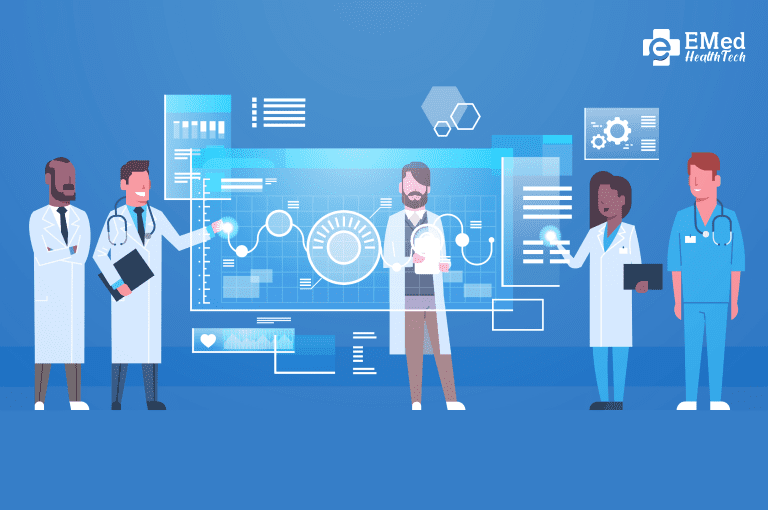Ami Kothari
Building healthcare software from scratch is no cakewalk. A lot of effort goes into ensuring the software works as planned and checks every box, from performance to compliance. However, this last bit is where many custom healthcare software development projects take stumble.
Healthcare regulatory and security compliance and regulations are matters that cannot be taken lightly. With authorities worldwide tightening up data security norms, the penalties for non-compliance are harsh, and companies at fault have to pay dearly. Earlier this year, a healthcare software provider was fined a whopping $1.5 million in fines to French data protection authorities. In the US, penalties for security violations by medical companies can cost up to $1.5 million.
In short, the devil is always in the details, and the nitty-gritty details in the regulations can land you in trouble.
Therefore, if you are planning on healthcare software or healthcare app development,
This article will give you an idea of what compliances and regulations are, why they are implemented, and the different regulations you should be aware of.
What are Regulatory Compliances for Healthcare Products?
As in every industry, the healthcare industry is also ruled by certain regulations that determine what is legal and illegal. These are designed with everyone’s best interest at heart, and not complying can come with hefty penalties. There are issues like privacy and data security, and safety and care for the patient that these regulations try to address. If healthcare software does not follow these regulations, it can invite large amounts of fines and disciplinary action from the government.
Every country has certain regulations the healthcare industry needs to follow while implementing healthcare software solutions. Some of the major regulations are given below.
- Health Insurance Portability and Accountability Act (HIPAA) -USA
- The Federal Food, Medicine, and Cosmetic Act-(FFDCA)-USA
- Food and Medicine Administration (FDA) -USA
- Health Information Technology for Economic and Clinical Health Act (HITECH) -USA
- Office of the Australian Information Commissioner (OAIC) – Australia
- Personal Information Protection and Electronic Documents Act (PIPEDA) -Canada
- General Data Protection Regulation (GDPR) — The European Union -European Union
Complying to these depending upon where your healthcare service is focused is crucial. Let us look at some of the reasons why regulations and compliances need to be followed.
Why Is It Essential to Follow Regulatory Compliance in Healthcare Software and App Development?
Privacy & Data Security
Regarding healthcare software development, the primary concern that regulations take care of is privacy and data security.
The digital world is constantly threatened with cyber attacks, and, naturally, there are potential threats to healthcare solutions too. The sensitive data that people share with healthcare providers are stored digitally. This software often uses cloud computing technology to function. All of these cyber spaces are prone to attacks and data theft.
This threat also makes people more reluctant to use software solutions, making everything much easier. It is a hurdle healthcare providers have to overcome. Thankfully, governments are issuing strict regulations that protect patient health information(PHI).
Patient-Centric Care
These regulations are not only about data protection but part of an overall effort to make healthcare more patient-centric. With these regulations in place, the healthcare IT service provider has to put the patient’s needs first and give utmost care to not let any slip-ups happen. It also curbs fraudulent practices within the healthcare system, ensuring no patient is taken advantage of by the big industry. In connection to the previous point, data protection protects the patient from potential emotional harm a data or identity theft can cause them.
Avoid Fines and financial losses
The price to pay for not complying with government regulations can be sometimes too high. It is rightly so as it is not a small thing to overlook. Fines as high as $1.5 million can be incurred if the healthcare software used does not comply with the regulations of the place.
A healthcare service provider can also incur heavy losses if these protective measures are not adhered to. Data breaches, holding data for ransom, etc are ways in which healthcare providers can be ensnared in the cyber traps.
Regulatory Approval
It goes without saying that you cannot get your software product to work in the public sector without the seal of approval from these regulatory bodies. Moving forward without gaining a certificate of compliance is impossible. Only in the case of updated regulations can the above problems come into existence.
These are some of the compliance reasons. Let us look at some of the healthcare standards you should be aware of before you hire healthcare software developers.
Regulatory Compliances for Healthtech Products in Different Countries
Countless regulations ensure compliance in the healthcare industry. Instead of it being a deterrent, it ensures better services and benefits for all involved. Some of the major ones are:
FFDCA – USA
The Federal Food, Medicine, and Cosmetic Act govern medical devices, under which healthcare software falls, pharmaceuticals, and more. To get FFDCA compliance, one has to first comply with several other approvals like the PMA (Pre-Market Approval), Pre-Cert Program (Digital Health Software Pre-Certification Program), SaMD (Software as a Medical Device), and the LDT (Laboratory Developed Test).
HIPAA – USA
The Health Insurance Portability and Accountability Act of 1996 defines the rules ones needs to follow if one intends to collect, store and exchange personal data from a customer. Healthcare facilities that do not comply with this can bring legal action against them.
If your software is related to PHI (protected health information), EMRs (electronic medical records), or EHR (electronic health records), then you need to comply with the HIPAA requirements.
HITECH Act – USA
The HITECH (Health Information Technology for Economic and Clinical) Act came into place to promote the adoption and meaningful use of health information technology. It enforces healthcare providers to comply with HIPAA regulations.
Food and Medicine Administration (FDA)
Every software application or standalone device meant for mass public use must first undergo the rigorous scrutiny of the FDA under the United States Department of Health and Human Services. FDA assesses the software for compliance and regulations and only then approves its use and distribution among the public.
OAIC – Australia
Regulations pertaining to the use and distribution of software and healthcare technology are administered by the OAIC or Office of the Australian Information Commissioner. It defines how the personal information from patients is collected, stored, and disclosed. It also gives patients full control over sensitive data. Healthcare providers must give them complete network security and immediate reports in case of data breaches.
PIPEDA – Canada
Personal Information Protection and Electronic Documents Act, 2000 (PIPEDA) governs the rules for personal information handled by businesses for commercial activity. It is similar to HIPAA, however, it provides additional data protection in medical apps. It can fine up to $100,000 for each case of violation.
General Data Protection Regulation (GDPR) — The European Union
This is generally applicable inside the European Union. Compared to other regulatory bodies, GDPR widens what falls under sensitive data, including biometric data, genetic data, IP addresses, and data on racial and ethnic origin and religion. Individuals can withdraw their consent at any time.
Conclusion
Compliances and Regulations in custom healthcare app development must be carefully considered before the final product is rolled out. It is better to be aware of and implement the regulations than to suffer financial losses and government legal action. Before you decide to hire healthcare app developers, you must check whether they have a history of non-compliance or legal action being taken against them.
Also, check out this blog A Guide to Custom Healthcare Software Development.
It is better to hire an experienced team that can provide the best custom healthcare services and solutions with all the necessary compliances than to clean up after the mess of an inexperienced team. EMed HealthTech is your best bet if you want to create a system that adheres to all regulations. We provide the best service to our clients with compliance followed to the dot and constant updates on all changing regulations. Reach out to us today to book an appointment with us at EMed HealthTech.
Related posts

Healthcare App
Generative AI In Healthcare: Meeting The Demand For Patient Care
Generative AI in Healthcare: A New Era of Patient Care
Read more
Healthcare Software
Transforming Healthcare: The Power of Software Development Solutions
Empowering Healthcare: Unleashing the Potential of Software Development Solutions
Read more
Healthcare Software
Top Challenges and Their Solutions in Healthcare Software Product Development
Top Challenges and Their Solutions in Healthcare Software Product Development
Read more







